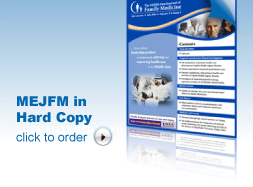|
|
 |
| ............................................................. |
|
|
| ........................................................ |
| From
the Editor |

|
Editorial
A. Abyad (Chief Editor)
DOI:10.5742/MEWFM.2019.93610
|
........................................................
|
|
Editorial
Dr.
Abdulrazak Abyad
DOI: 10.5742/MEWFM.2019.93623
Original Contribution
Self-monitoring
of Blood Glucose Among Type-2 Diabetic Patients:
An Analytical Cross-Sectional Study
[pdf]
Ahmed S. Alzahrani, Rishi K. Bharti, Hassan
M. Al-musa, Shweta Chaudhary
DOI: 10.5742/MEWFM.2019.93624
White
coat hypertension may actually be an acute phase
reactant in the body
[pdf]
Mehmet Rami Helvaci, Orhan Ayyildiz, Orhan Ekrem
Muftuoglu, Mehmet Gundogdu, Abdulrazak Abyad,
Lesley Pocock
DOI: 10.5742/MEWFM.2019.93625
Case Report
An
Unusual Persistent Mullerian Duct Syndrome in
a child in Abha city: A Case Report
[pdf]
Youssef Ali Mohamad Alqahtani, Abdulrazak Tamim
Abdulrazak, Hessa Gilban, Rasha Mirdad, Ashwaq
Y. Asiri, Rishi Kumar Bharti, Shweta Chaudhary
DOI: 10.5742/MEWFM.2019.93628
Population and Community
Studies
Prevalence
of abdominal obesity and its associated comorbid
condition in adult Yemeni people of Sana’a
City
[pdf]
Mohammed Ahmed Bamashmos
DOI: 10.5742/MEWFM.2019.93626
Smoking
may even cause irritable bowel syndrome
[pdf]
Mehmet Rami Helvaci, Guner Dede, Yasin Yildirim,
Semih Salaz, Abdulrazak Abyad, Lesley Pocock
DOI: 10.5742/MEWFM.2019.93629
Systematic
literature review on early onset dementia
[pdf]
Wendy Eskine
DOI: 10.5742/MEWFM.2019.93627
|
|
Chief
Editor -
Abdulrazak
Abyad
MD, MPH, MBA, AGSF, AFCHSE
.........................................................
Editorial
Office -
Abyad Medical Center & Middle East Longevity
Institute
Azmi Street, Abdo Center,
PO BOX 618
Tripoli, Lebanon
Phone: (961) 6-443684
Fax: (961) 6-443685
Email:
aabyad@cyberia.net.lb
.........................................................
Publisher
-
Lesley
Pocock
medi+WORLD International
AUSTRALIA
Email:
lesleypocock@mediworld.com.au
.........................................................
Editorial
Enquiries -
abyad@cyberia.net.lb
.........................................................
Advertising
Enquiries -
lesleypocock@mediworld.com.au
.........................................................
While all
efforts have been made to ensure the accuracy
of the information in this journal, opinions
expressed are those of the authors and do not
necessarily reflect the views of The Publishers,
Editor or the Editorial Board. The publishers,
Editor and Editorial Board cannot be held responsible
for errors or any consequences arising from
the use of information contained in this journal;
or the views and opinions expressed. Publication
of any advertisements does not constitute any
endorsement by the Publishers and Editors of
the product advertised.
The contents
of this journal are copyright. Apart from any
fair dealing for purposes of private study,
research, criticism or review, as permitted
under the Australian Copyright Act, no part
of this program may be reproduced without the
permission of the publisher.
|
|
|
| March 2019 - Volume
17, Issue 3 |
|
|
Effect of undergraduate teaching
modules on residents EBM competency
Mazen Ferwana (1)
Ali Ibrahim Hadadi (2)
Wedad Al Madani (3)
Bader Al Khateeb (4)
Mohi Eldin Magzoub (5)
(1) Professor of Family Medicine, King Saud
bin Abdulaziz University for Health Sciences,
Co-Director, National & Gulf Center for
Evidence Based Health Practice, Consultant,
Family Medicine & Primary Healthcare Department,
King Abdulaziz Medical City, Ministry of National
Guard Health Affairs, Riyadh, Kingdom of Saudi
Arabia.
(2) Medical Student , College of Medicine, King
Saud bin Abdulaziz University for Health Sciences,
Riyadh, Kingdom of Saudi Arabia.
(3) Coordinator I, National & Gulf Center
for Evidence Based Health Practice, King Saud
bin
Abdulaziz University for Health Sciences, Riyadh,
Kingdom of Saudi Arabia.
(4) Associate Dean of Academic & Student
Affairs, College of Public Health and Health
Informatics (CPHHI), KSAU-HS; Dirab Primary
Health Care Director; Family Medicine Residency
Program, Clinical Trainer; JA Assistant Professor;
Family Medicine Consultant, Riyadh, Kingdom
of Saudi Arabia.
(5) Professor, Medical Education, College of
Medicine, King Saud bin Abdulaziz University
for Health Sciences, Riyadh, Kingdom of Saudi
Arabia.
Corresponding author:
Mazen Ferwana
Professor of Family Medicine, King Saud bin
Abdulaziz University for Health Sciences, Co-Director,
National & Gulf Center for Evidence Based
Health Practice, Consultant, Family Medicine
& Primary Healthcare Department, King Abdulaziz
Medical City, Ministry of National Guard Health
Affairs, Riyadh, Kingdom of Saudi Arabia
Email: ferwanam@ngha.med.sa
Received: December 2018; Accepted: January
2019; Published: February 1, 2019
Citation: Ferwana M. et al. Effect of undergraduate
teaching modules on residents EBM competency.
World Family Medicine. 2019; 17(2): 40-48 DOI:
10.5742/MEWFM.2019.9361

|
Abstract
Objectives: To
investigate the effectiveness of the problem
based teaching integration in medical
schools compared with traditional teaching
on residents EBM performance.
Materials and
Methods: We conducted a questionnaire
based, cross-sectional survey among all
residents from various medical specialties
for 6 years from 2008 to 2013.
Result and Conclusion:
Two hundred and twenty nine first year
residents participated in the study. 75.3%
of the participants had evidence based
medicine in their curricula, either in
the academic or clinical years or both.
The majority of participants feel that
evidence based medicine helped them in
their daily patient care practice.
Key words:
Problem Based learning, Evidence based
Medicine, Residents, Saudi Arabia
|
|
|
.................................................................................................................

|
| |
 |

